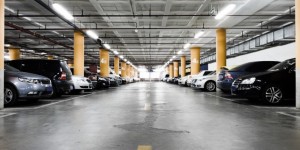A workplace parking levy scheme could be introduced by Bristol City Council to fund its planned mass transit scheme, Mayor Marvin Rees said this week as he outlined measures aimed at limiting the impact of climate change on the city.
In a speech to coincide with Clean Air Day, he said the scheme would be “done responsibly and with our business partners” but did not give further details. 
Bristol City Council last year became the first UK council to declare a climate emergency – a move followed in April by the University of Bristol – making it the first university to do so.
In his speech at the Create Centre, Mayor Rees said declaring the emergency was just one part of creating a green, healthy and prosperous city.
Other measures outlined in the speech included putting active travel at the heart of the plans for the Western Harbour (Cumberland Basin) development.
“This will include planning that brings homes together with retail and entertainment in the name of minimising the need to travel,” he said.
Introducing green walls and roofs through urban vertical gardening is also to be considered and the council will structurally reviewing car parks, large buildings and walls where possible to bring them alive.
He also said the council had submitted a bid to the future High Streets Fund and was focussed on re-designing Nelson Street in the city centre. This would include re-modelling the old city and removing traffic from parts of it.
He said: “We are overturning decades of failure and under investment and have opened up the prospect of a mass transit system – including an underground – with ultra-low carbon output. And despite the negativity and lack of belief from my political opponents and the understandable caution of many citizens, who struggled to believe anything from a city with such a tragic record of failure, we are now making progress and could link the city centre to the south and to the airport within eight years.”
He also said the Labour administration’s aim is that within three years it will:
- Achieve the gold standard for Bristol in the Sustainable Food City Awards,
- Be using smart energy technology to support the efficient use of energy in over 50% of homes, the proportion growing year on year thereafter;
- Increasing the number of taxis on Ultra Low Emissions;
- Have a full fleet of bio-fuel buses;
- Continue metro west developments to grow rail usage;
- Have a fully operational freight consolidation centre, reducing freight journeys in and around the city centre;
- Complete the ring of park and rides around the city to reduce the number of commuter cars driving in.
He said: “Improving air quality is another perfect example of how we need to be inclusive. We cannot slide into categorizing people who drive cars or anyone who doesn’t experience the world as we do, as the enemy.
“Of course cars are a contributor. But they are also the inevitable consequence of decades of failure resulting in a limited public transport offer. We will eliminate the worst polluting vehicles and we will improve the worst polluted areas. But we will do it by acknowledging the potential impacts on the lowest income households and we will do it by ensuring we protect and drive a sustainable, inclusive economy.
“We will only achieve modal shift by offering better alternatives. Any change to arrangements for people coming into the city centre to work, will be protected with mitigations for the lowest paid and a scrappage scheme or car replacement scheme for the oldest cars, for those who need support to buy a newer, cleaner car.
“We are continuing the modelling because we are pursuing the quickest path to compliance and we will listen to all citizens while we do so.”
The planned mass transit system will have three key routes linking the city with Bristol Airport via South Bristol; the city centre, and North Bristol, including Cribbs Causeway; and a link from the city centre to East Bristol. It will include underground sections in the city centre.






























